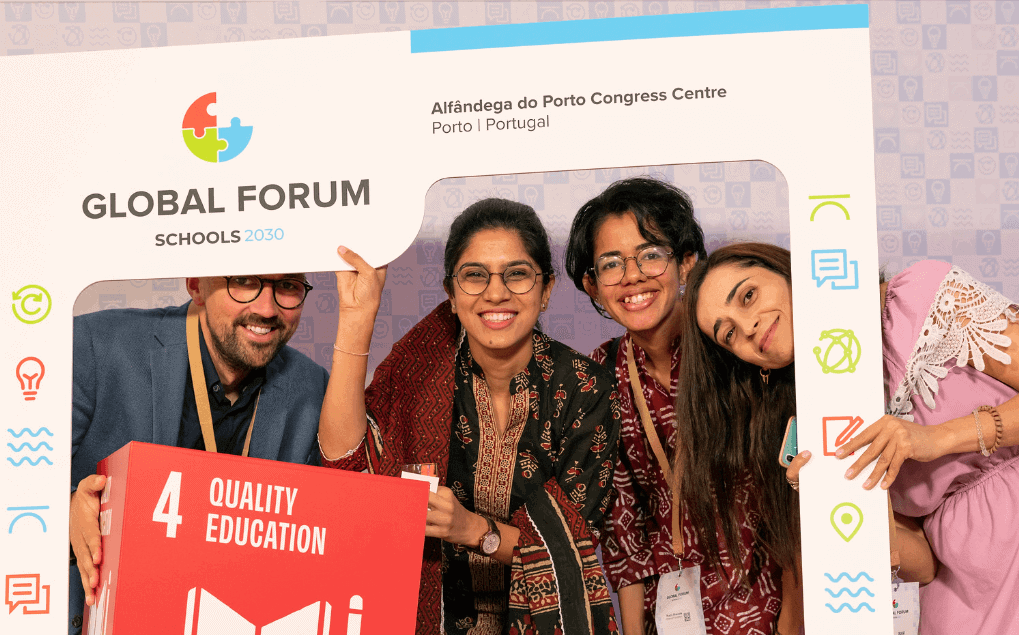A cross-section of delegates from global education systems once again gathered, this time in the beautiful city of Porto, Portugal, brought together by the question of how we might foster more inclusive schools and more pluralistic learning societies. A rich event of learning, celebrating, sharing and thinking ensued. The pictures below tell the story of what happened during the three days.
Day 1 – Promoting Inclusivity and Equity in and through the Early Years
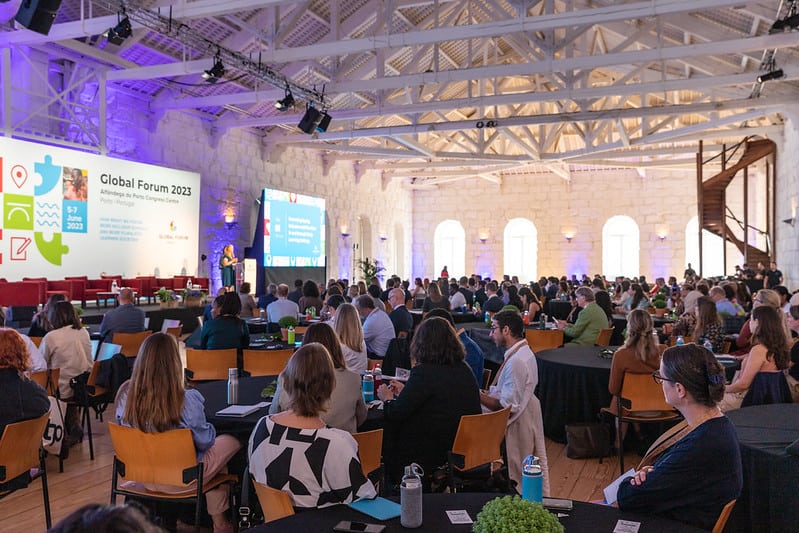
Over 250 delegates from over 35 countries gather on the opening day of the second annual Schools2030 Global Forum in the beautiful Archive Hall at the Centro de Congressos Alfândega do Porto, Portugal. The building, based on the banks of the river Douro, was once a functioning customs house, and Archive Hall was where the archives were once stored.
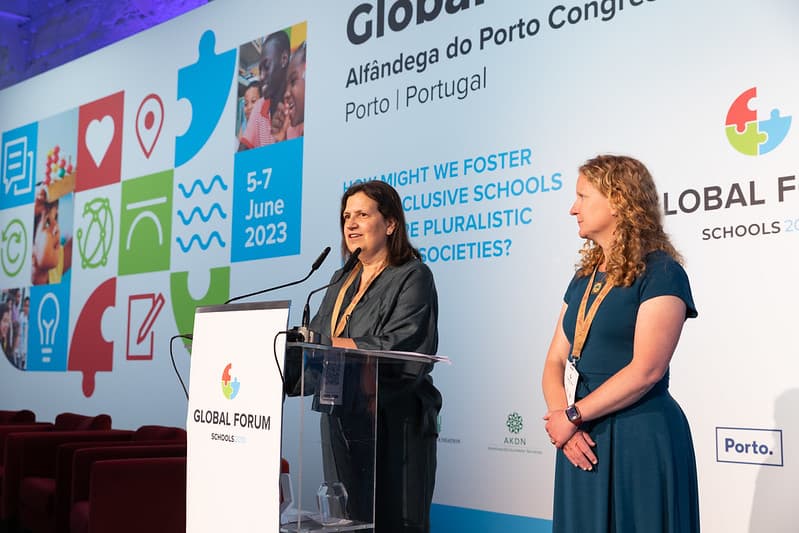
The first day is opened by Alexandra Marques (left), National Coordinator for Schools2030 in Portugal, and Dr Bronwen Magrath, the Schools2030 Global Programme Manager, who announce the day’s focus on fostering inclusivity in and through the early years.
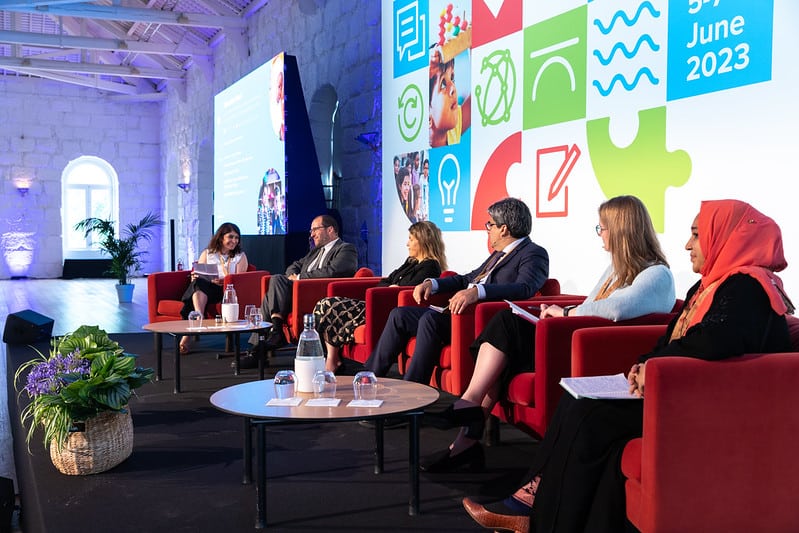
From left to right: Nafisa Shekhova, AKF’s Global Lead for Education and ECD, moderates the first discussion with panellists João Costa (Minister of Education, Portugal); Ana Sofia Antunes (Secretary of State for Inclusion and Social Security, Portugal); Martín Benavides (IIEP-UNESCO); Abbie Raikes (University of Nebraska and ECD Measure); and Naima Adam (Madrasa Early Childhood Programme, Kenya).
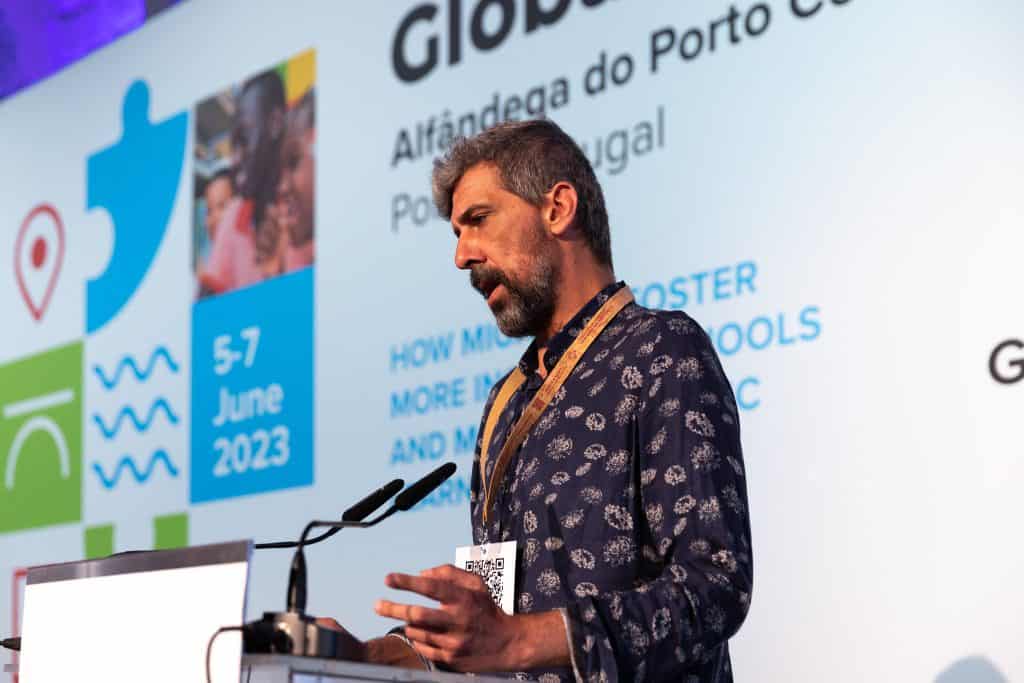
Teacher, Rogério Pereira, from School Cluster Algueirão, SIntra, Portugal, presents his innovation for creating more outside learning opportunities at the first day’s Teacher Showcase session. His practices are showing initial positive results in increasing empathy, collaboration and creativity amongst his students, as well as respect for their environment.
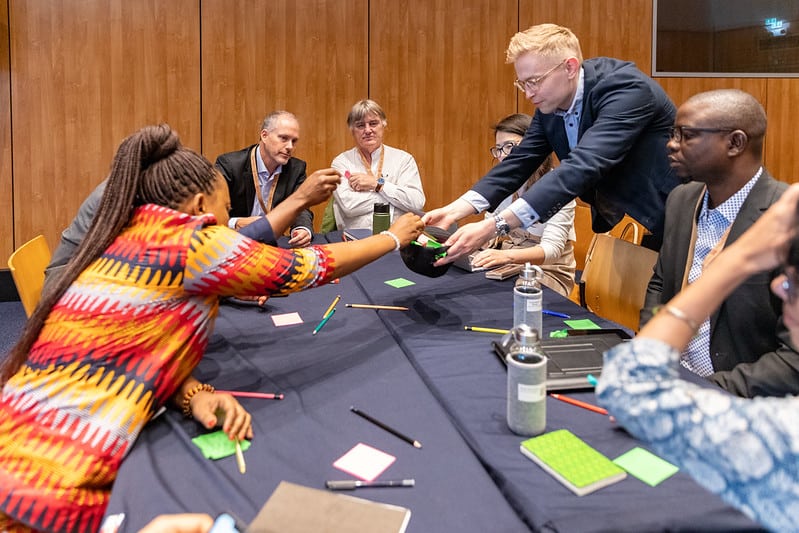
Schools2030 partner, HundrED, lead a challenge session about how learning and sharing with others can support the teaching of climate resilience. Through this session, HundrED demonstrated the power of the Faved platform as a mechanism for sharing great teaching practices worldwide.
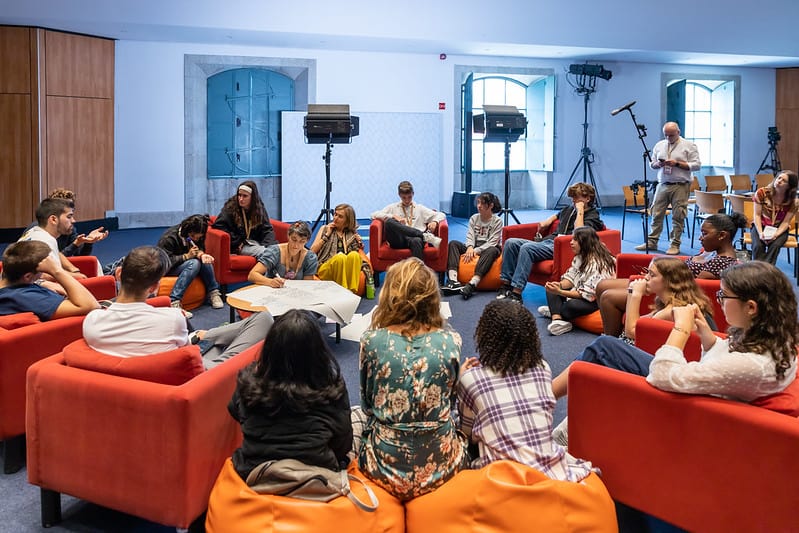
Young people from across a variety of schools in Porto and Lisbon gathered in several youth-specific workshops designed for them to explore their responses to the Youth Declaration made last year at the Transforming Education Summit. The sessions were lively, with many reporting that they needed a whole week to discuss their ideas.
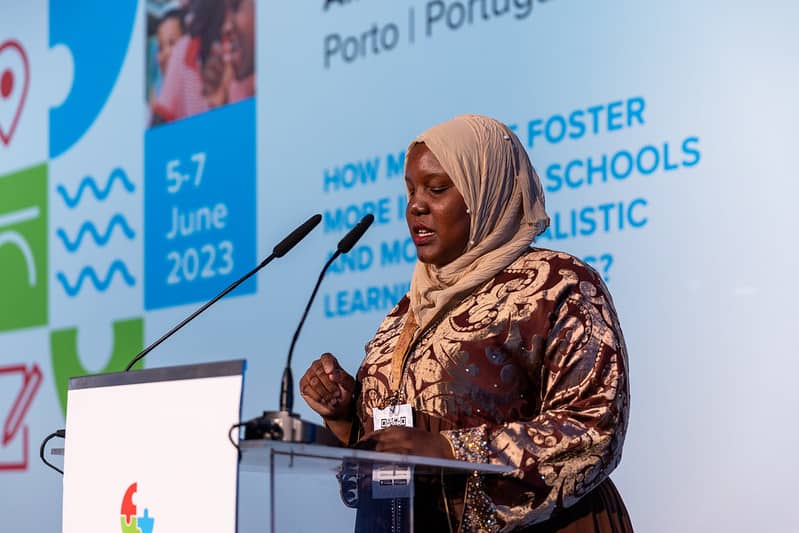
Jamila Mayanja, a Schools2030 educator from Uganda, delivers a keynote at the Schools2030 Global Forum opening ceremony. During her speech, she explained how she had used the Schools2030 model to start “a new innovation – Girls with Tools – to skill vulnerable young girls with male-dominated STEM skills” such as mechanics.
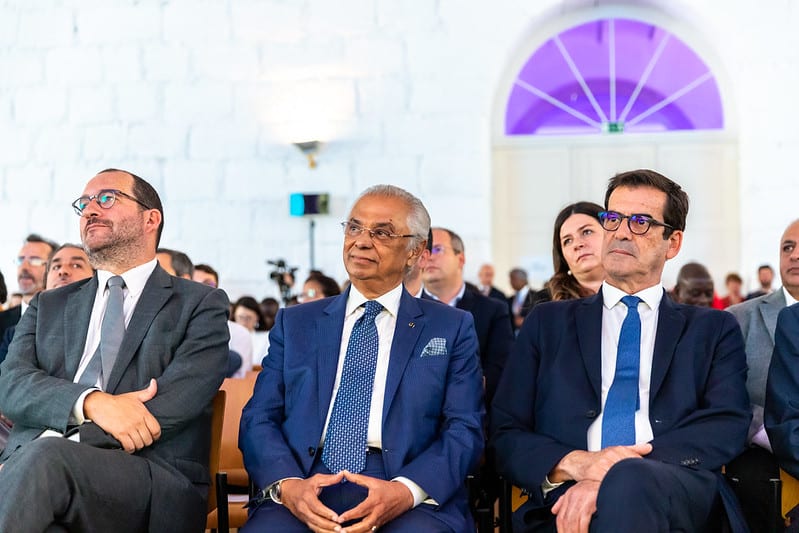
From left to right: Minister for Education for Portugal, João Costa, Resident Representative for the Portuguese Imamat, Nazim Ahmed, and Mayor of Porto, Rui Moreira, listen intently to the panel discussing the catalytic role of philanthropy in furthering inclusive and equitable education systems during the Global Forum opening ceremony.
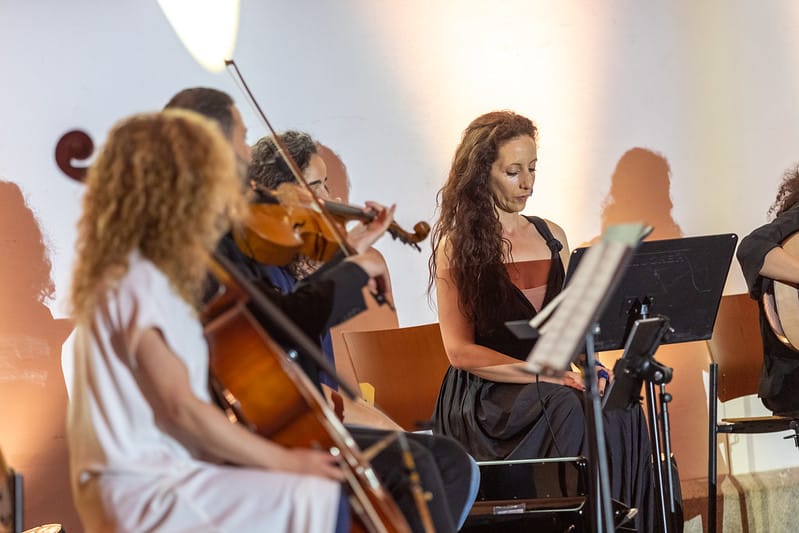
Musicians from the Aga Khan Music Programme (AKMP) play at a concert on the first day of the Global Forum. AKMP supports musicians from across the globe to keep alive cultural and musical traditions that might otherwise be lost to time. The concert featured musicians from Syria, Uzbekistan and Tajikistan, amongst others.
Day 2 – Promoting Inclusivity and Equity through our Schooling Systems
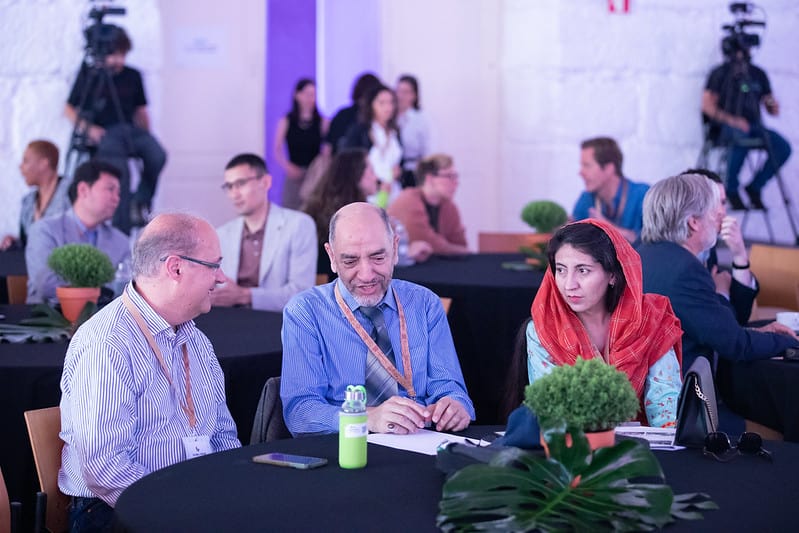
Delegates gather in Archive Hall for the second day’s discussions and workshops. From left to right: Mauro Figueiredo, a Professor from the University of the Algarve; Shakoor Muhammad, Schools2030 National Coordinator in Pakistan; and Shazia Bibi, a teacher at Government Girls’ Secondary School Murdan, Chitral, Pakistan.
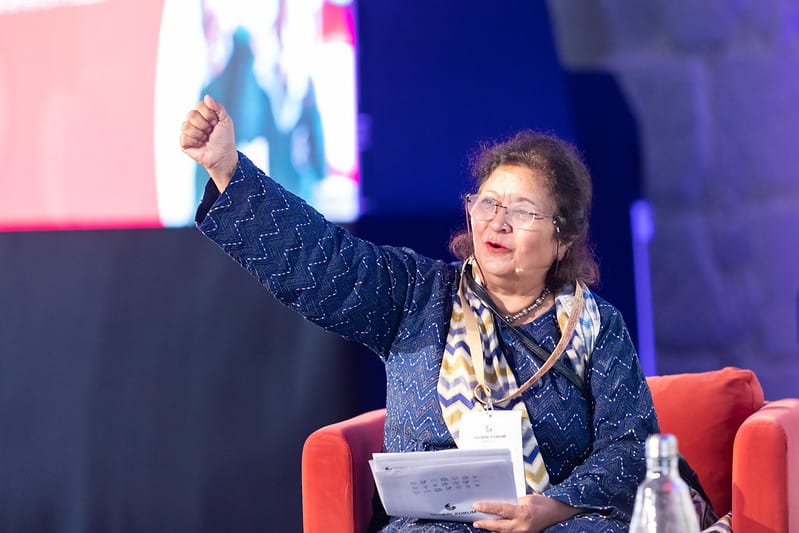
Baela Jamil, ITA Pakistan (a Schools2030 Research Partner), leads the discussion panel on Day 2 with a rousing cry of ‘Schools2030 Zindabad!’ (Long live Schools2030!) before the panel explore how we might best promote inclusivity in the classroom.
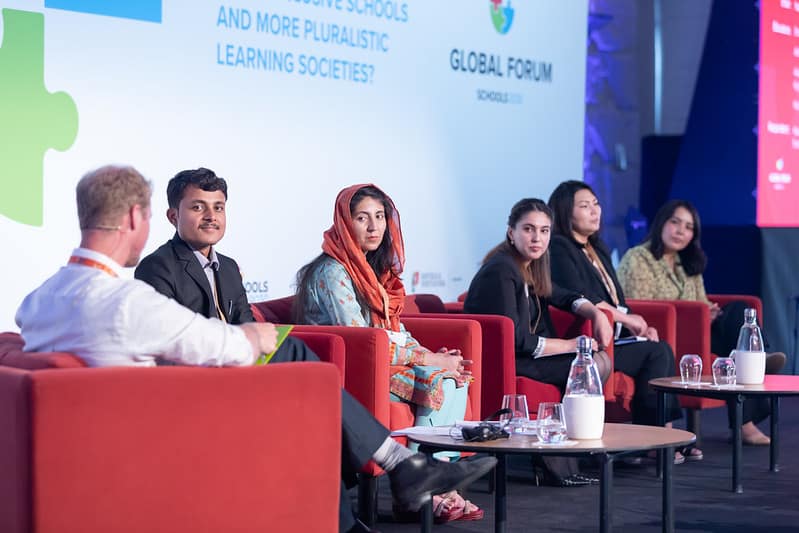
Maurits Spoelder from Education Cannot Wait (left), responds to teachers who presented their innovative practices for improving equity and inclusion. From left to right, the teachers are: Abhishek Kumar, a maths teacher from Basic School Bakhari in Muzzafarpur, India; Shazia Bibi from Government Girls’ Secondary School Murdan, Chitral, Pakistan; Muhamadieva Nazokat, a teacher at General Secondary School No. 2, Tajikistan; and Aikanysh Zotova, from Shivaza General Secondary School, Alexandrovka village, Kyrgyz Republic. On the far right is Nazira Zholdoshbekova, Schools2030’s National Coordinator in the Kyrgyz Republic.
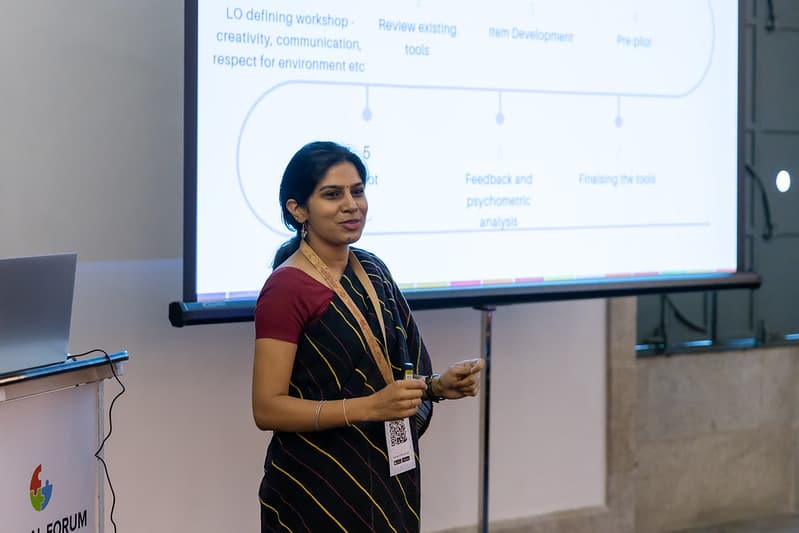
Nitika Meena, from Eklavya, Schools2030 India’s Assessment and Learning Partner, co-leads a challenge session on how to create valid, reliable measures of holistic learning that can be usable by and useful for teachers in a range of contexts.
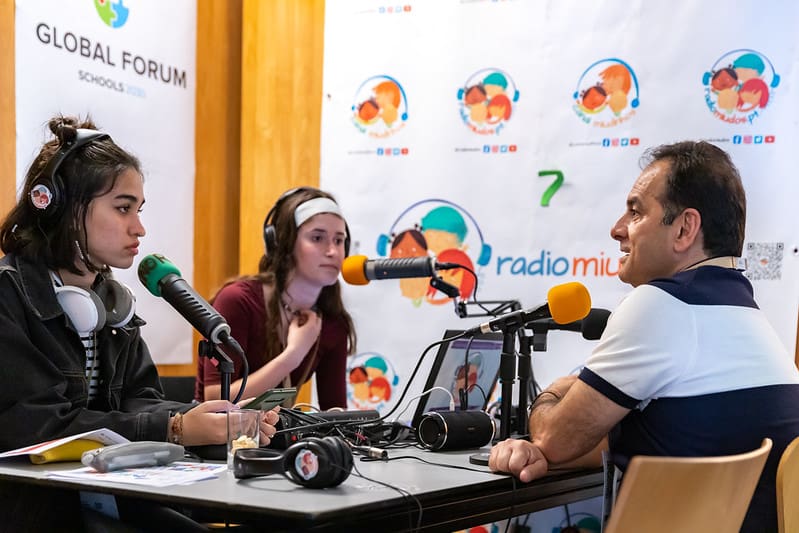
A youth-led Portuguese radio station – Radio Miúdos – broadcasting from their booth at the Global Forum, where they broadcast interviews with several delegates, including the CEO of AKF Portugal, Karim Merali, seen here. The interviews were streamed live online throughout the three days.
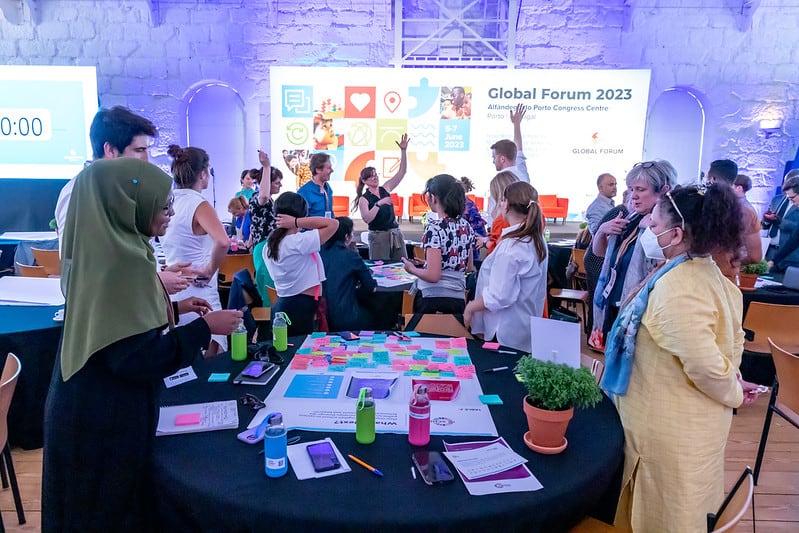
Day 2’s afternoon session brought all delegates together for a large Human-Centred Design workshop that explored what’s next for Schools2030 and how we might we strengthen school-to-system pathways and partnerships through the Schools2030 movement and beyond. Delegates can be seen above in an energiser that celebrates the act of making mistakes.
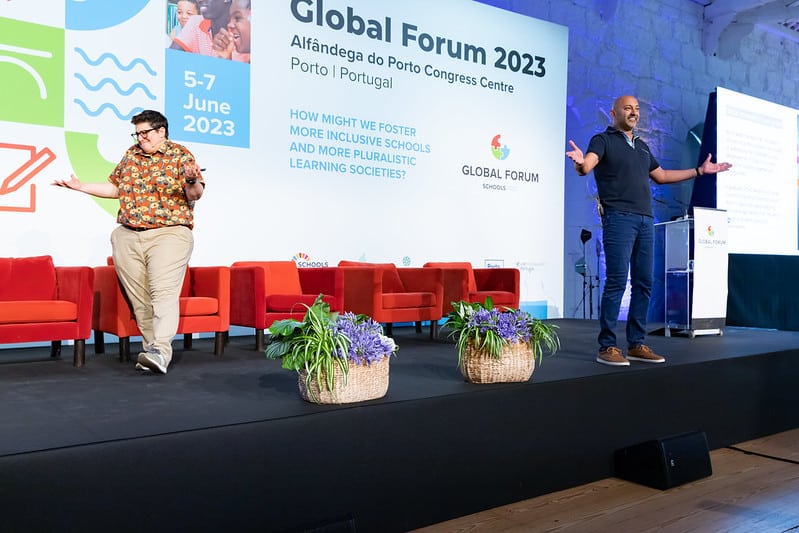
Katie Krummeck (AKF’s Global Design Advisor) and Munir Ahmad (AKF’s Global Lead for Innovation) leading the all-delegate design workshop, demonstrating the process of exploration and embracing the unknown that Human-Centred Design allows for.
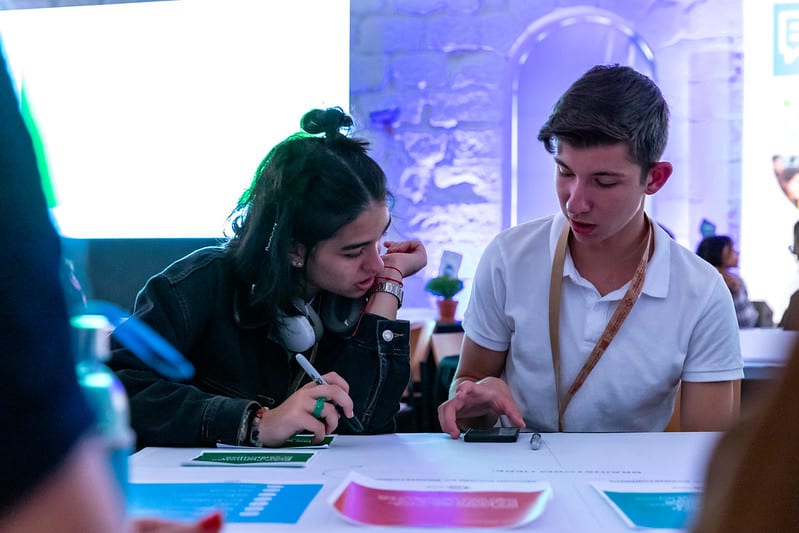
Young people were invited to join the afternoon session and work alongside delegates to determine how Schools2030 might best develop strong school-to-system links during Phase 2 of its operations.
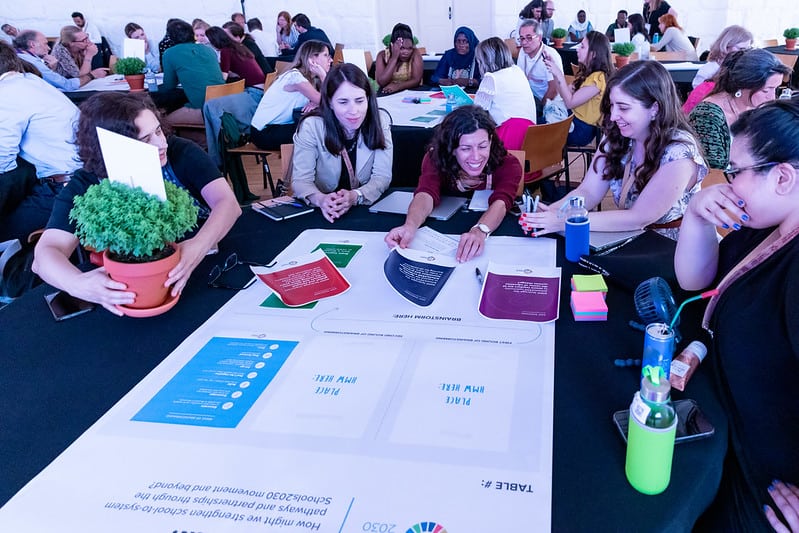
Schools2030 partners Joana Cadima and Ana Camacho (centre; centre right) from the University of Porto work alongside Rayana Fazli (right) from AKF Afghanistan, as well as Susana Martins and Ana Rita Coelho (left, centre left) from University Institute of Lisbon at the afternoon Human-Centred Design workshop.
Day 3 – Promoting Inclusive and Equitable Learning Opportunities for Youth
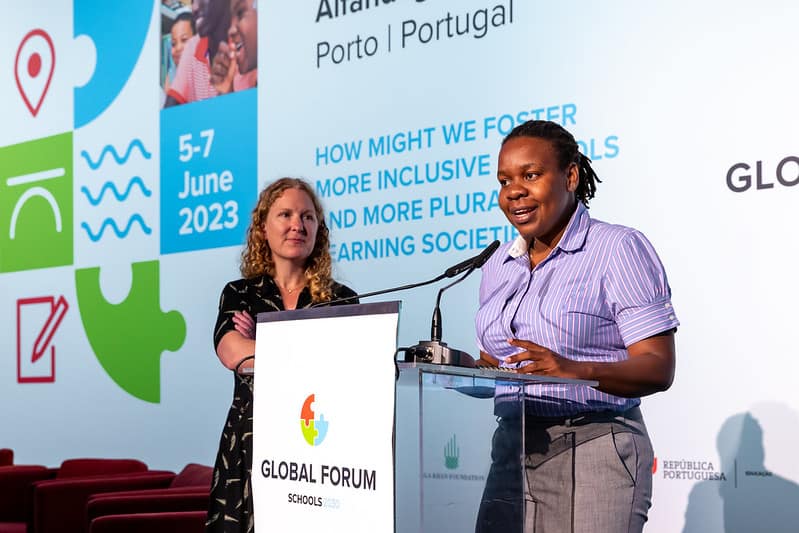
UNICEF Generation Unlimited Peace Ambassador, Wevyn Muganda, shares the stage with Bronwen Magrath to reflect on Day 2 and open the conversations for the final day of the Forum. During her speech, Wevyn explained how important education is in peace-building activities.
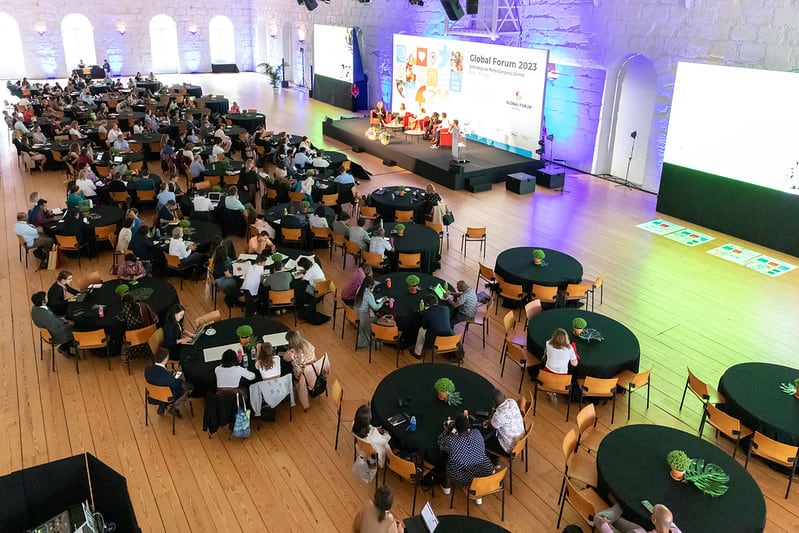
The view from above: delegates seated at tables in the Archive Hall during Day 3’s discussion panel on supporting young people outside of traditional schooling systems. On the right, on the floor, we can see the idea posters created from the previous day’s HCD workshop on strengthening Schools2030’s Phase 2.
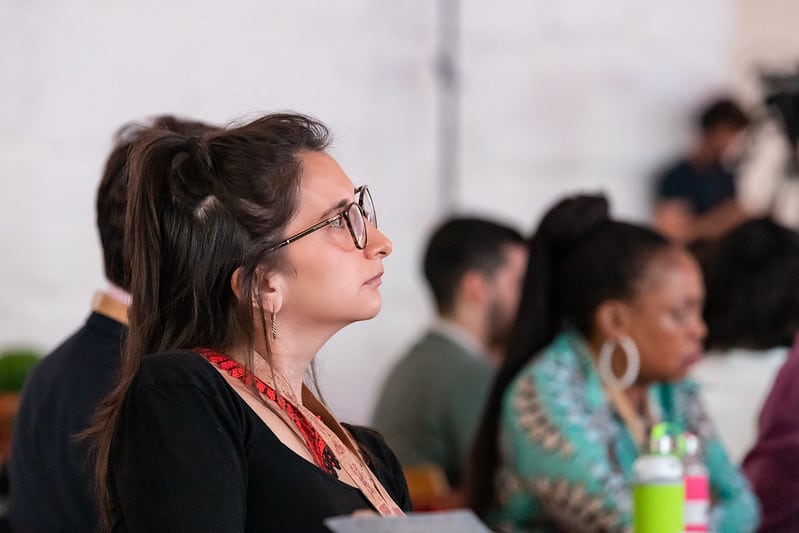
Active listening: Natalia Agudelo, a Teach for All Alumni from Spain, listening intently at the opening discussion panel on Day 3 of the Global Forum. Behind her sits a Schools2030 teacher from Mbande Primary School in Tanzania, Mwajuma Athumani Mlezi.
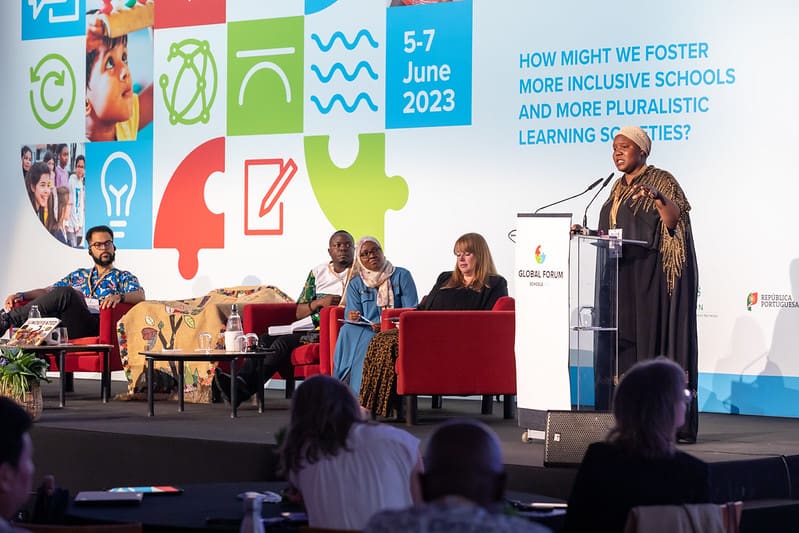
Jamila Mayanja (right), a Schools2030 Educator from Uganda, presents her ‘Girls with Tools’ initiative, in a showcase session with educators from Brazil and Kenya. Brazil’s Diego Elias (left) presented about the innovative pedagogies being practised at Campo Liempo, a non-formal education centre for youth and adults to gain literacy and other skills; and Alfred Sigo (centre left) from the Pwani Youth Network who presented ‘Changemakers4Life’ – an initiative that helps prevent substance abuse and other antisocial activities through a programme of mentorship, sports and cultural exploration. Halima Shaaban (centre), Schools2030’s National Coordinator for Kenya chaired the session, with responses from Tara Painter (centre right) from Global Affairs Canada.
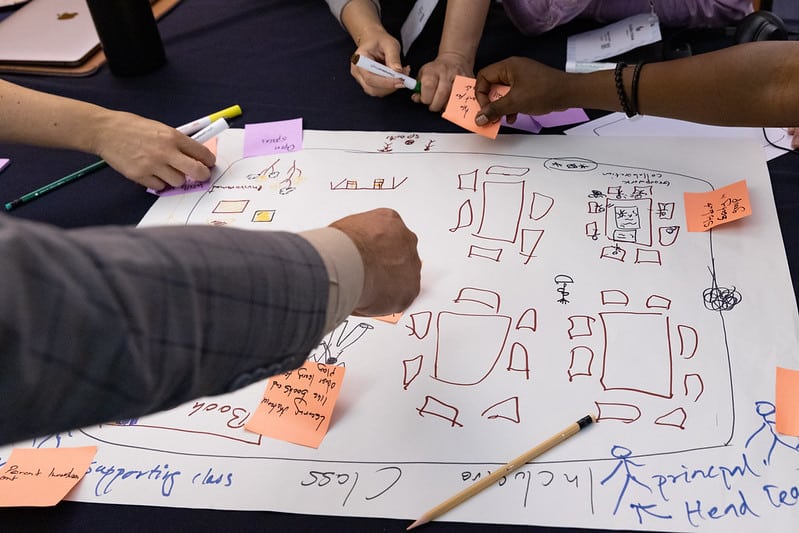
Participants in a challenge workshop identify different systemic factors that impact inclusive and equitable learning in classrooms settings and brainstorm ways to overcome these barriers.
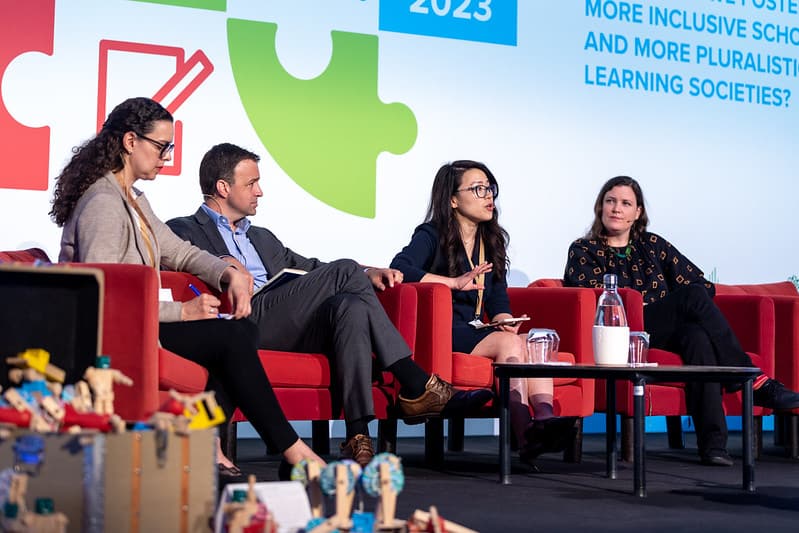
A panel discussion on Day 3 in the afternoon saw (from left to right) Maja Groff (Climate Governance Commission) in conversation with Kevin Frey (UNICEF Generation Unlimited), Won Jung Byun (UNESCO) and Sarah Beardmore (Global Partnership for Education). The panellists explored how we might best support the role of educators to tackle the climate crisis.
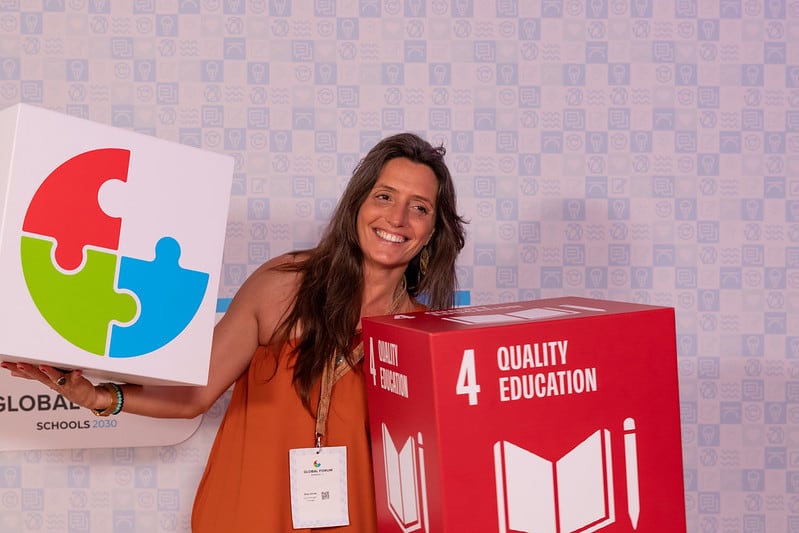
Rita Alves, Senior Education Officer for AKF Portugal, poses with the SDG4 cube that has become a feature of the Schools2030 Global Forum photo booths.
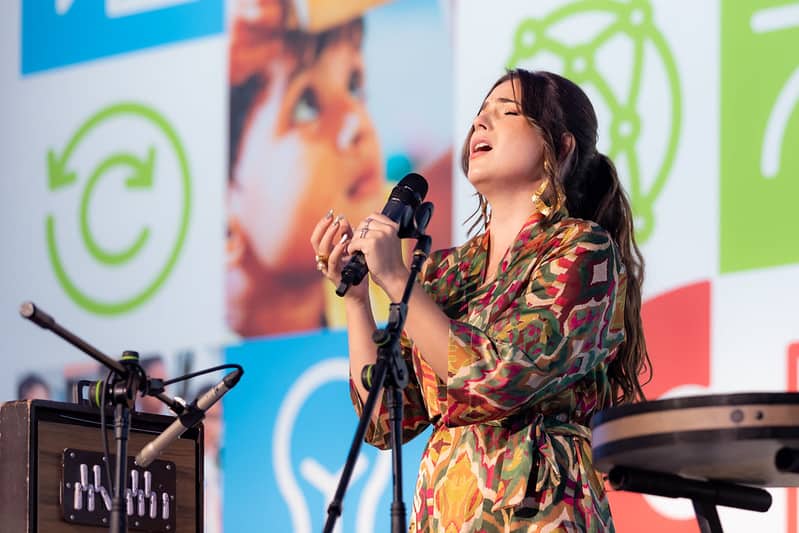
The beautiful Fado performance as part of the Global Forum closing ceremony. Vocalist Mariana Arroja led the trio, which included Pedro Barosa on guitar and Rui Pedro Claro on Portuguese guitar, in three evocative songs in the traditional Portuguese style.
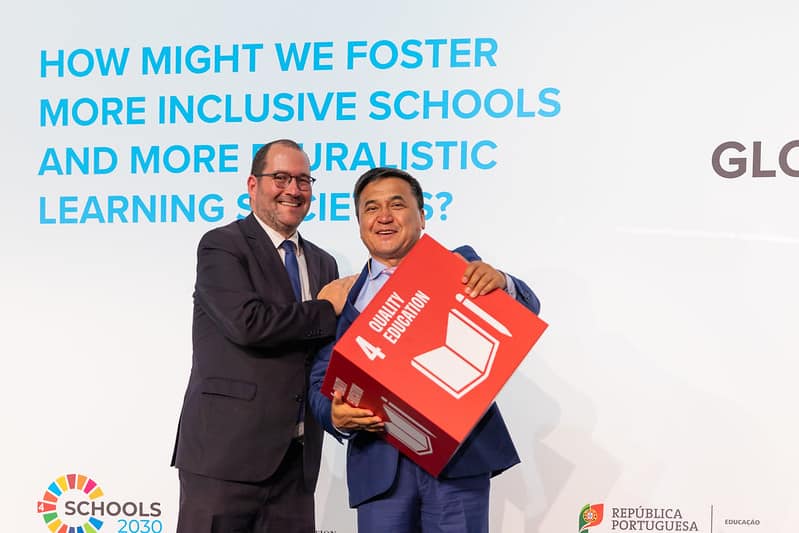
The Global Forum closing ceremony and handover: Minister for Education for Portugal, João Costa, hands the SDG4 cube to his counterpart, Kanybek Imanaliev, Minister for Education and Science for the Kyrgyz Republic. The handing over of the cube represents the handing over of the Global Forum hosting responsibilities, with next year’s Forum dates announced for 11-13th June 2024 in Bishkek.
